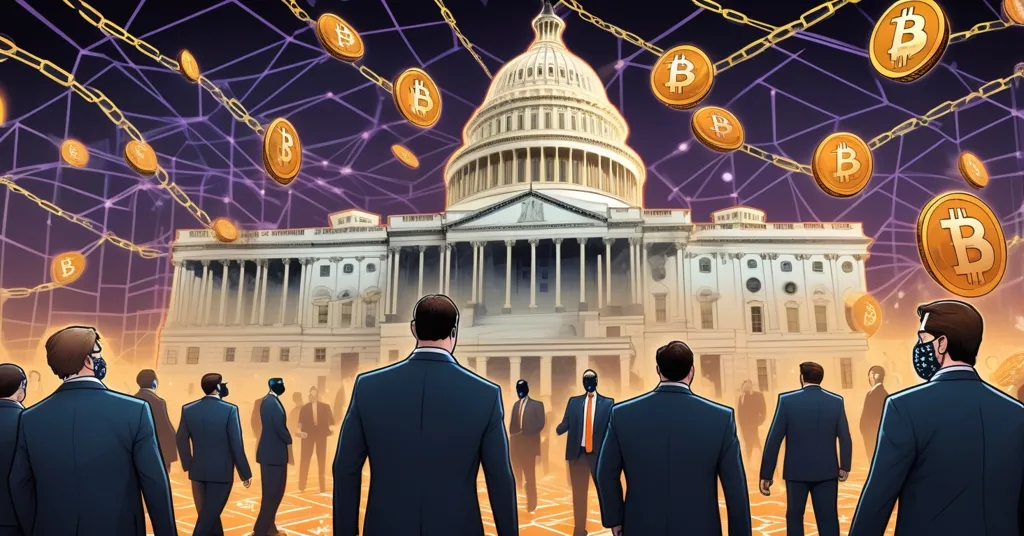US Senate Standoff and Trump’s Crypto Push: Regulation Chaos Unfolds

US Senate Gridlock and Trump’s Crypto Gambit: A Regulatory Rollercoaster
Washington is a cauldron of conflict as the U.S. Senate wrestles over cryptocurrency regulation, while Donald Trump’s bold moves and murky ties add fuel to an already fiery debate. From partisan standoffs over landmark legislation to global alliances and questionable DeFi ventures, the crypto space is caught between revolutionary potential and a regulatory mess that could make or break its future.
- Senate Democrats and Republicans clash over the Responsible Financial Innovation Act (RFIA) 2025, stalling progress.
- Trump pushes crypto into mainstream finance with retirement plan policies, while family-linked projects raise alarms.
- Global collaborations and CFTC uncertainties shape a complex landscape for digital assets.
Senate Standoff: RFIA 2025 Hangs in the Balance
The U.S. Senate Banking Committee is ground zero for a bitter partisan battle over the future of digital asset regulation. At the center is the Responsible Financial Innovation Act (RFIA) 2025, a pivotal bill designed to carve out a framework for how cryptocurrencies and blockchain technologies integrate into the financial system. Think of it as the rulebook for a high-stakes game: it decides who plays referee (regulators like the CFTC or SEC), what counts as a goal (classifying assets as securities or commodities), and how players (investors and innovators) are protected or penalized. A well-crafted bill could position the U.S. as a global leader in blockchain tech; a botched one could choke innovation and send talent fleeing to friendlier jurisdictions.
On September 19, Senate Democrats, including Ruben Gallego of Arizona and Kristen Gillibrand of New York—both known for pro-crypto stances—released a statement demanding a seat at the table. Their message was sharp and unambiguous:
“Agree to a bipartisan authorship process, as is the norm for legislation of this scale. Given our shared interest in moving forward quickly on this issue, we hope they will agree to reasonable requests to allow for true collaboration.”
Republicans, led by Senate Banking Committee chair Tim Scott of South Carolina, aren’t budging. Scott’s spokesperson, Jeff Naft, fired back with a thinly veiled challenge, expressing hope that “their Democratic counterparts will come to the table to make America the crypto capital of the world.” Senator Cynthia Lummis of Wyoming, another GOP heavyweight, insists they’ve been seeking Democratic input since July. Yet, with markup delayed until October 20, the rift seems deeper than mere scheduling conflicts. This isn’t just politics for politics’ sake—the RFIA would hand significant oversight of crypto markets to the Commodity Futures Trading Commission (CFTC), under the purview of the Senate Agriculture Committee, making every clause a battleground. For Bitcoin holders, these delays mean lingering uncertainty over taxes and trading rules. For smaller altcoin projects, a heavy-handed CFTC could spell disaster. Will partisan games tank crypto’s momentum in the U.S., or is this just the messy birth of a new financial era? For more on the ongoing Senate market structure disputes and the CFTC leadership uncertainties, the debate is far from over.
Some history for context: the U.S. has fumbled crypto regulation for years. Past efforts, like the stalled 2022 bills, died amid agency turf wars between the SEC and CFTC. RFIA 2025 represents a chance to end that chaos, but only if lawmakers can stop posturing long enough to compromise. For now, the gridlock persists, and the clock is ticking.
Stablecoin Clarity: Tweaking the GENIUS Act
While the Senate bickers, other legislative gears are grinding. House Representative French Hill of Arkansas, a key architect of crypto policy, is advocating amendments to the GENIUS Act, signed into law by President Trump in July. Hill’s goal is to weave in stablecoin provisions from his prior CLARITY Act, focusing on issuer accountability and stricter controls. For the unacquainted, stablecoins are digital currencies pegged to stable assets like the U.S. dollar to avoid the wild price swings of Bitcoin or Ethereum—think of them as the steady, if less glamorous, workhorses of crypto. Hill’s push for stablecoin regulation in 2025 aims to prevent disasters like the 2022 TerraUSD collapse, where a so-called stablecoin lost its peg and torched billions in investor value due to shaky reserves. His amendments could bring clarity to a shadowy corner of the market, ensuring issuers aren’t gambling with unbacked promises.
But not everyone’s cheering. Some in the decentralized finance (DeFi) community—those building financial systems on blockchain to bypass traditional middlemen like banks—worry this is a slippery slope to overreach. If stablecoins become too tightly leashed, could that stifle innovation in DeFi protocols that rely on them for liquidity? On the flip side, without rules, the next Terra-level implosion could sour public trust in all digital assets, Bitcoin included. It’s a tightrope act, and Hill’s amendments are just one piece of a much larger puzzle.
Global Game: U.S.-U.K. Crypto Alliance Takes Shape
While domestic debates drag on, the U.S. is looking overseas for partners in taming the borderless beast of blockchain. A newly formed Transatlantic Taskforce for Markets of the Future, involving the U.S. Treasury Department under Secretary Scott Bessent and U.K. officials like Chancellor Rachel Reeves, has a 180-day mandate to align policies on digital assets and capital markets. This isn’t just diplomatic fluff—crypto doesn’t respect national boundaries, and fragmented rules create loopholes for bad actors while confusing legitimate players. Could this taskforce harmonize cross-border transactions, making it easier for Bitcoin or Ethereum users to operate globally? Or might it exclude smaller nations and blockchains not at the negotiating table, undermining the decentralized ethos we champion?
Meanwhile, the U.K.’s Financial Conduct Authority (FCA) is showing signs of progress. After approving just 15% of crypto applications over five years, their rate jumped to 45% in the last six months, even as applications dropped by nearly half since 2023. It’s a hint that regulators are getting savvier, balancing innovation with oversight. For Bitcoin maximalists, global coordination might seem like creeping centralization—but in a world where scams and hacks cross oceans in seconds, collaboration could be the lesser evil.
Trump’s Crypto Push: Retirement Plans and Risky Bets
Donald Trump’s influence on digital assets is impossible to ignore. In August, he issued an executive order urging the inclusion of cryptocurrencies in 401(k) retirement plans, a move backed by House GOP members now pressing the SEC for regulatory updates. Imagine your risk-averse grandma hodling Bitcoin alongside bonds—revolutionary or reckless? You decide. For those of us rooting for financial freedom, it’s a ballsy middle finger to Wall Street’s stranglehold, a chance to drag digital assets into every American’s portfolio. But let’s not ignore the elephant in the room: crypto’s volatility is brutal. Bitcoin plummeted from $69,000 to under $20,000 in 2022, and similar crashes could obliterate retirement savings in a heartbeat. Trump’s vision for mainstream adoption is thrilling, but without guardrails, it risks screwing over the unprepared. Could this spark long-term demand for BTC, or will a market dump trigger a backlash?
Family Ventures: World Liberty Financial’s Dark Shadows
Trump’s crypto ambitions get murkier with his family’s involvement in World Liberty Financial (WLF), a DeFi platform touting disruption of traditional finance. WLF recently endorsed the Winklevoss twins’ Digital Freedom Fund PAC, aligning with Trump’s broader goals. As WLF declared on social media, they’re “proud to stand behind [Digital Freedom Fund] with the twins and other crypto industry leaders, to advance President Trump’s crypto vision.” Co-founders Zach Witkoff and Zak Folkman are driving the charge, while Forbes reports suggest Eric, Don Jr., and Barron Trump are reaping significant earnings from WLF-tied ventures. Sounds like a win for crypto’s mainstream push, right? Hold your applause.
WLF’s governance token, WLFI, saw a buy-and-burn proposal—where tokens are repurchased and destroyed to potentially inflate value—pass with a near-unanimous 99.84% approval. Yet the token’s price swung wildly, peaking above $0.25 before cratering below $0.20. That’s suspicious enough, but the real stench comes from reports by Accountable.US and Forbes alleging some token holders are linked to the Lazarus Group, a North Korean hacking syndicate tied to billions in crypto thefts like the 2019 Upbit exchange heist. If true, this isn’t just bad optics—it’s a national security nightmare, potentially funneling funds to state-sponsored cybercriminals. Even if it’s unproven, as some defenders argue, the mere rumor damages DeFi’s already fragile reputation. For Bitcoin purists, this reinforces why BTC’s simplicity and transparency trump convoluted altcoin projects. For DeFi advocates, it’s a brutal reminder that innovation often attracts the worst kind of attention. What does this mean for you? If you’re in DeFi, WLF’s drama could spook newcomers, slowing adoption. If you’re a BTC holder, it’s another reason to question whether political cheerleading helps or hurts the cause.
CFTC Chaos: A Regulator in Limbo
Amid the legislative and political circus, the CFTC—slated to become crypto’s primary watchdog under RFIA—faces its own storm. Trump’s nominee for CFTC chair, Brian Quintenz, is on shaky ground. The White House is reportedly considering alternatives after fierce opposition from Cameron and Tyler Winklevoss, founders of Gemini exchange. Tyler didn’t hold back, slamming Quintenz as “actually quite antithetical to the ethos of crypto and decentralization.” With the CFTC down to one commissioner, Caroline Pham, filling this role is urgent. Pham recently bolstered the agency’s Digital Asset Markets Subcommittee, naming Scott Lucas from J.P. Morgan as co-chair alongside new members from Uniswap Labs, Aptos Labs, and Chainlink Labs. Pham praised Lucas’s “deep knowledge and experience with distributed ledger technology,” calling it “indispensable” for navigating blockchain’s rapid evolution.
But without a confirmed chair, the CFTC risks being a toothless overseer at a critical juncture. Why does this matter for crypto users? If RFIA passes, the CFTC will dictate rules for trading, derivatives, and more—directly impacting how you buy, sell, or hold Bitcoin and altcoins. A leader misaligned with decentralization could push stifling policies, while delays in appointment mean regulatory limbo. The stakes couldn’t be higher.
Community Pulse: What’s the Crypto Crowd Saying?
Beyond Capitol Hill, the crypto community is buzzing. On platforms like Twitter and Reddit, sentiment is split. Bitcoin maximalists like Max Keiser have blasted political meddling, tweeting that “BTC doesn’t need Trump or the Senate—it needs freedom.” Meanwhile, Ethereum co-founder Vitalik Buterin recently mused on social media about regulatory clarity, warning that “bad rules are worse than no rules for scalable blockchains.” DeFi users on forums express wariness over WLF’s scandals, with one Redditor quipping, “If Trump’s DeFi is the future, I’m sticking to cold storage.” These voices underscore a truth: while lawmakers and tycoons jockey for control, the heart of crypto—its users—craves autonomy over agendas. This tension between grassroots innovation and top-down governance is the real battle playing out.
Crypto Regulation FAQs: What You Need to Know
- What’s stalling U.S. crypto legislation?
The Senate is deadlocked on RFIA 2025, with Democrats pushing for bipartisan input and Republicans sticking to their draft, delaying markup to October 20 and leaving tax and trading rules in limbo. - How is Trump shaping crypto policy?
Trump’s executive order for crypto in 401(k) plans aims to mainstream digital assets, but his family’s ties to controversial ventures like WLF risk tainting the push with scandal. - Why is the CFTC chair nomination critical?
The CFTC will oversee much of crypto under RFIA, but opposition to nominee Brian Quintenz for lacking decentralization values could stall vital regulatory progress. - What’s the impact of the U.S.-U.K. crypto taskforce?
Set to align digital asset policies within 180 days, it tackles the global nature of blockchain, potentially easing cross-border transactions but raising questions about centralized control. - Should we trust projects like World Liberty Financial?
Hell no—not yet. WLF’s token volatility and alleged links to hackers like the Lazarus Group are massive red flags, threatening trust in DeFi despite its Trump-backed vision.
Let’s cut through the noise. The potential for Bitcoin and blockchain to redefine money, power, and freedom is undeniable—we’re all in on effective accelerationism, where decentralized tech outpaces bureaucratic sludge. But the pitfalls are just as real: regulatory gridlock, political opportunism, and scams masquerading as innovation. The Senate needs to quit the partisan charade, Trump’s crew must ditch the shady baggage, and regulators like the CFTC have to strike a balance between oversight and liberty. If they don’t, 2025 could be the year crypto’s promise stalls—or the year Bitcoin proves it thrives despite the chaos. One thing’s certain: this revolution isn’t won by sitting on the sidelines. Stay vigilant, because the future of finance is being written right now, flaws and all.



